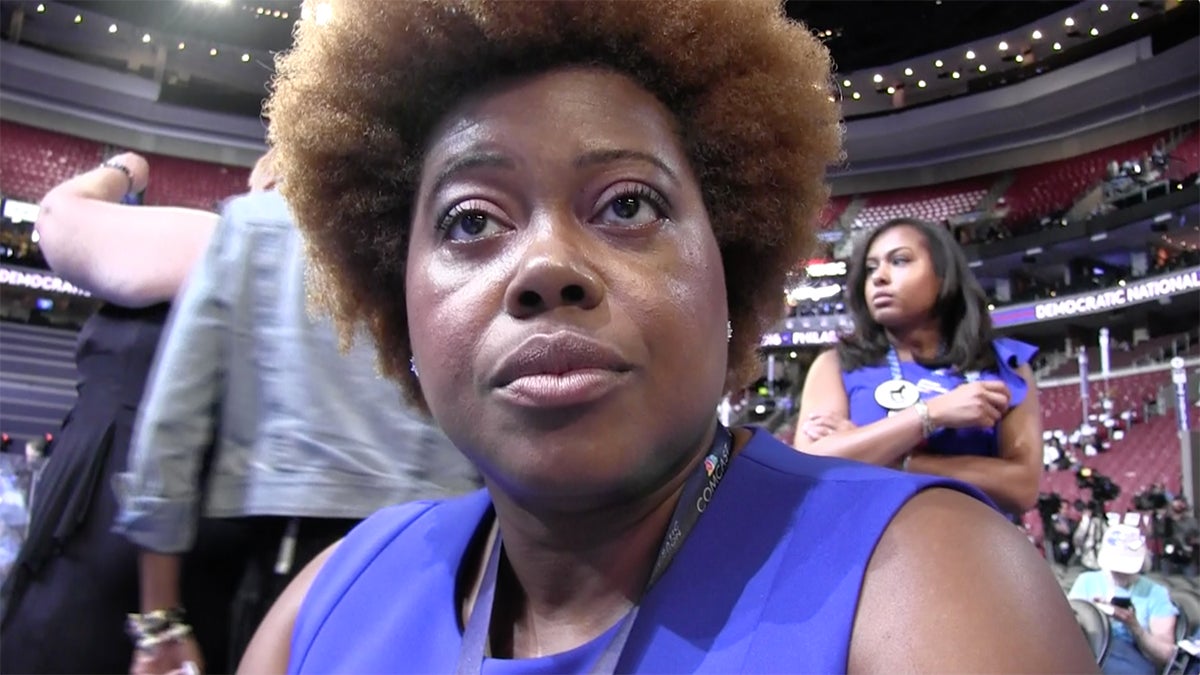Clinton must heal the racial divide among supporters

Pennsylvania delegate Melissa Robbins at the Democratic National Convention (Solomon Jones for NewsWorks)
The mood at the Wells Fargo Center ahead of Hillary Clinton’s prime time speech to the Democratic National Convention was quiet.
As a singing group filled the arena with the cloying strains of “You’ve Got A Friend,” snapshots of a younger Hillary Clinton flashed across the giant video screen at center stage. This was practice. Later, the real show would begin.
That was the scene on the last day of the Democratic gathering in Philadelphia. Gone were the sounds of protest that had filled the streets and halls surrounding the Wells Fargo Center. Outside, the skies were filling with clouds. Torrential rains would soon fall.
Inside, however, there was cautious optimism — a collective wish for sunshine.
Later that evening, Hillary Clinton would deliver the most important speech of her long political career. That speech — more than the inspirational words of President Obama, or the fiery oratory of Michelle Obama, or the pensive reflections of Bill Clinton — would determine not only the direction of Hillary Clinton’s campaign.
Her speech, on the final night of the Democratic National Convention, would determine the direction of the country.
That’s because the choice is clear in this election.-We can be led by a center-left pragmatist in Hillary Clinton, or a right-wing nationalist in Donald Trump. No matter which side of the ideological coin one prefers, there is no confusing the two.
Those in the Democratic party’s Pennsylvania delegation are keenly aware of that fact. Among them are Philadelphia City Council members like South Philadelphia’s Kenyatta Johnson, Cherelle Parker of Northwest Philadelphia, and at-large member Blondell Reynolds Brown. As they arrived in the hall ahead of Clinton’s speech, each told me that they’re firmly in Clinton’s camp.
But the wounds of the contentious Democratic primary are still fresh, and those who supported Vermont Sen. Bernie Sanders are also in the Pennsylvania delegation. I spoke with several of them, and asked what they were feeling as they prepared to watch Clinton take center stage.
“First and foremost I am a gung ho Bernie Sanders supporter,” said Pennsylvania delegate Melissa Robbins, an African American military veteran from Philadelphia. “I worked on [Sanders’] campaign, I ran the West Philadelphia and Southwest Philadelphia field offices. However, when Sen. Sanders stood up there the other night and he graciously conceded to the Secretary, at that point we knew as delegates that we are to honor what Bernie Sanders wants.
“I have to support the Secretary,” Robbins said. “She has the nomination. This is our country. This is not about Bernie, not about Hillary, not about Barack Obama. This is about American people—issues affecting everyday people. So how dare [I] be so selfish and not put my differences aside and support our country and our party?”
But when pressed about the Sanders supporters who continue to say they won’t support Clinton even after Sanders asked them to do so, Robbins was firm.
“Those people should ask themselves: ‘Do they really want to wake up to a Trump presidency and are they willing to take that chance?’ If they care so much about Bernie, then they know that Bernie cares about people from all walks of life, all ethnicities and all backgrounds.”
And therein lies the conflict. Sanders, while conveying a message that appealed to some African American millennials, never gained traction among the older black electorate. That demographic went overwhelmingly for Clinton.
But now that the primary is over, the racial divide among some Clinton and Sanders supporters could present a problem for Democrats. Some white Sanders supporters are openly saying they will support Trump over Clinton, despite the Republican presidential nominee voicing bigoted views on race, ethnicity and religion.
Why would these Sanders supporters switch to a candidate who is seemingly the antithesis of the progressive they initially backed?
“I believe that they’re somewhat out of touch with reality,” said delegate Michael Rahming, a black man from Philadelphia. “And I also do feel like those are the people that will be largely unimpacted by a Donald Trump presidency.”
Melissa Robbins agreed.
“If [the holdouts] wholeheartedly support Sen. Sanders, then they themselves should be concerned for what life will be like for people of color under a Trump presidency,” she said. “Then if in fact they support Bernie Sanders so much, can they put their own selfishness aside? Can they do that?”
If the Democrats have any hope of winning in November, Clinton must help them to do so.
Listen to Solomon Jones weekdays 7-10 a.m. on 900 AM WURD.
WHYY is your source for fact-based, in-depth journalism and information. As a nonprofit organization, we rely on financial support from readers like you. Please give today.


